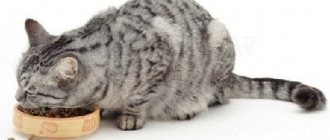- Cats
- General issues
Many cat owners do not think about the dangers of the food they give to their furry pets. But veterinarians say that cats should not include fish in their diet, although many pets eat it with pleasure. When consumed regularly, the product causes inflammation of the kidneys in animals, disruption of metabolic processes, and causes helminthic infestation and vitamin deficiency. In order not to cause a negative reaction in your pet, it is important to carefully monitor your pet’s diet and give it fish in limited quantities and only of certain varieties.
Why cats should be given fish: arguments from owners
Why not? After all, he/she needs it - for health, for shiny fur, in the end, because it has always been like this - from time immemorial! This is the thinking of most owners who succumb to the complaints of their four-legged friends and pamper them with “delicious food”. For them, the benefits of this product are indisputable - after all, it contains Omega-3 and Omega-6 - fatty acids that have an extremely beneficial effect on the body - they prevent the development of many diseases, make the coat glossy and thick, and have an anti-inflammatory effect.
Here are a few more arguments from owners who prefer “natural” to “drying” - river, sea, raw and boiled, smoked and salted:
- Cats have always eaten fish.
This argument can be heard in all disputes devoted to the proper nutrition of our little brothers. They say that for many millennia such fearless hunters took their inhabitants from ponds, rivers and lakes, and then ate them. This proves the attachment of four-legged pets to pike, perch, capelin, whiting. However, in declaring this, we forget that it was man who got the cat addicted to fish. The distant ancestors of our pets were their African wild counterparts. They were even afraid to approach the water, let alone put their paws in it. But they hunted rodents and larger animals with great pleasure. It turns out that a mouse is a more natural food for a domestic cat than the same fish.
photo from website: wallpapersafari.com
- In the villages, all the cats ate fish and did not complain.
Of course, they only lived much less than the city dwellers. Often it was the diet, which included everything that fell from the owner, that became and continues to become the cause of illness and death of village animals. Do you want your cat to suffer the same fate?
- I had a friend whose Fluff/Barsik/Vaska ate fish all the time and lived a long time.
What significance can an example with some Barsik or Vaska have if the body of each pet is individual? Some people have excellent health, while others experience allergy attacks every time the owner feeds them perch or burbot freshly caught from the river. Do not transfer other people's experiences to your pets. Remember: what is a delicacy for one can become real poison for another.
- What about healthy fish oil?
It can be completely replaced by including special additives in the cat’s diet, which we will discuss at the end of the article.
As you can see, all the myths have been destroyed, and the question of whether it is possible to feed a cat raw and boiled fish every day should no longer arise for a caring owner. However, one explanation is not enough; irrefutable evidence of harm is also necessary. After all, if in front of the owner the animal does not feel sick from what he eats, he is unlikely to take a completely different position after hearing arguments against it.
So, let us repeat once again: you cannot overfeed your pet with what you brought from the store or caught in the nearest pond, and this is a fact. Why? We will talk about this in detail below.
The benefits of fish for cats
It is now fashionable to say that cats are absolutely not allowed to fish. But many continue to give it to their pet, rightly believing that thousands of cats have happily lived long lives on a fish diet. And it’s fair to say that such food has a number of advantages.
Complete set of amino acids
Fish is a complete protein of animal origin. It is easily digested in the short intestines of cats and contains essential amino acids, including taurine. Depending on the type of fish, the amount of protein is 16-24%, and it is absorbed by 95-98%, in contrast to meat protein - 87-90%.
Source of Omega-3 Fatty Acids
Unlike humans, it is not lean fish that is healthier for a cat, but fatty fish. In river fish (ruff, perch, pike) the fat content does not exceed 4%, the same amount in pollock, cod, and flounder. Noble varieties of fish contain 9-25% fat: herring, salmon, mackerel, sturgeon. Fat serves as a valuable source of energy and essential Omega-3 acids. Unsaturated fatty acids ensure healthy skin and coat, help reduce inflammation in the joints, and are necessary for the normal functioning of the heart and kidneys. If the cat does not get enough omega-3 acids from food, it is recommended to administer them in the form of dietary supplements (fish oil).
Thus, with fatty fish, the cat receives high-quality protein and the optimal amount of “good” fat. Claims that fish is not a species-specific food for cats are unsubstantiated. In the same way, it is not natural to feed your pet beef or chicken, because in nature a cat would eat a mouse or small bird whole, with head, skin, entrails and bones.
And what should I do with this fish?
Attractive taste and aroma
Many cats love the smell of fish and seafood. You can easily add vegetables to your pet’s food by grinding them together with fish, and even feed the tablet. Using fish juice, they flavor the water, stimulating the cat to drink more - this is necessary for diseases of the urinary system.
Even a small amount of fish in industrial food can make the product attractive to cats - this property has been successfully used, for example, in the production of “unpalatable” food for cats with kidney failure (Renal).
Fish...murrr
In other words, fish is a good way to pamper your cat, diversify the menu, and even encourage desirable behavior (training). But fish can bring not benefits, but great harm to health, if fed incorrectly.
Why cats should not be given fish in large quantities
photo from the site: thecatsite.com
If you think that the animal’s stomach will easily digest what you put in its bowl by carefully removing the bones or mashing them - when boiling blue whiting or pollock - you are mistaken. Our pets digest this kind of food with great difficulty. And the body of a domesticated animal is not adapted to the composition of fish. Here's an example: the majority of seals fed by their owners to a diet of river and sea creatures develop urolithiasis (UCD).
The fact that a pet enthusiastically devours boiled or fried carp, silver carp or gudgeon does not mean that such food will be good for it. The consequences of monotonous and improper feeding are as follows:
- Fish contains a large amount of salts. They affect the functioning of the kidneys - over time, an important organ fails, and you have to take the animal to the veterinarian to begin treatment. Neutered cats are most susceptible to the harmful effects of salt. And magnesium and phosphorus become the very building materials on which stones are formed.
photo from website: wallpaperist.com
- Can feeding fish worsen a cat's health? Certainly. Let's start with the fact that together with it you can introduce worms into your pet's body, which will then have to be expelled by carrying out mandatory deworming. Another horror story for owners that continues to be relevant to this day is opisthorchiasis. This is the name for prolonged helminthiasis, during which the liver, pancreas, and gall bladder are damaged. That's why cats can't eat raw fish - even if they insist on asking for it.
- If you feed your pet fish every day, be prepared for him to develop hypovitaminosis. The reason for its occurrence is the action of the enzyme thiaminase. It destroys vitamin B1, leads to impaired absorption of iron, and then to anemia. Due to prolonged feeding of natural and “natural” foods for cats, our four-legged friends suffer from a lack of vitamins E and K (necessary for normal blood clotting). As a result of disruption of the synthesis of the latter, any bleeding (even the slightest) can lead to a disappointing outcome.
Why can't cats be fed fish? After all, it contains iodine, which is so useful! Yes, but not in the quantities in which it enters the body of animals that consume this product every day. The consequence of the accumulation of an important element is the development of hyperthyroidism, and with it a dysfunction of the thyroid gland, the occurrence of heart and vascular diseases.
- And finally, one more argument: fish protein is a strong allergen. If you haven't noticed any unpleasant symptoms yet, you're in luck. However, those who have already taken their animal to the clinic and were forced to follow the treatment rules by putting the cat on a strict diet will no longer want to feed their pet only fish.
Here are just a few possible scenarios that could happen in reality if you don’t stop feeding your animal natural products that are harmful to it. And here are additional arguments that lovers of nutrition as close to natural as possible forget about.
What about dry fish food?
Let's consider the composition of high-quality feeds, in which fish is used as the main source of protein (in cheap feeds, fishmeal acts only as a flavoring agent).
- Acana Pacifica: used whole herring, sardine and flounder (whole carcass with bones and giblets), whole sea bass and hake, cod fillet. The fat content of the feed is 20%, the calcium to phosphorus ratio is 1.4:1, choline chloride (vitamin B4) and vitamins K and E are added additionally.
- Now Natural Fish Adult Recipe: component No. 1 of trout fillet, additionally enriched with many vitamins, minerals and individual amino acids. 19% fat, phosphorus content is significantly less than in Akan.
- Aatu Cat Salmon&Herring: salmon fillet and whole herring. Vitamins A, D, E, iron, zinc, manganese and amino acids – additionally. 18% fat, calcium to phosphorus 1.3:1.
These foods are safe for cats because:
- no injuries from fish bones;
- the fish has been heat-treated - there are no parasites or substances that destroy vitamins;
- the balance of calcium and phosphorus is maintained;
- a large amount of animal protein maintains the acidic environment of urine, which is the best prevention of urolithiasis;
- vitamins and microelements are added additionally or at the expense of other feed components.
The only threat that remains open is the toxins contained in marine fish. The mercury content in animal feed should be controlled, but it is difficult to say whether this is actually the case. Owners should avoid constant use of dry and wet tuna-based food, as it is the leader in the content of heavy metals.
Can cats eat fish with bones: sharp and dangerous?
photo from website: siberiantimes.com
Bones are the reason for many visits to the veterinarian:
- They can damage the larynx while the pet chews the meat.
- Passing through the esophagus, sharp fragments scratch its walls and provoke serious injuries and bleeding.
- Once in the animal's intestines, an acute foreign body leads to the onset of an inflammatory process, sepsis or perforation.
Such consequences are not just another exaggeration, but a warning for those who include exclusively pollock, blue whiting, and perch in their pet’s diet, and then complain about their pet: they don’t eat other food at all. Alas, our smaller brothers quickly get used to this menu and demand it again and again. They have no idea how dangerous their favorite treat is in large quantities.
Why was fish considered harmful?
The opinion that it is harmful for cats to eat fish arose some time ago - in an era of widespread shortage. There were no special (let alone high-quality) food for pets in stores at that time, and most cats ate whatever they had to eat. But rather, what fell from the owners’ table. One of the popular “foods” back then was cheap fish with bones, boiled with porridge. Poor nutrition, lack of vitamins, low mobility - and the result was urolithiasis in most cats.
The advent of inexpensive, economy cat foods only made the situation worse a few years later. Among their ingredients was high-ash fishmeal, which was not good for the animals. Hence the conclusion that fish and what is produced from fish is harmful to the health of cats and causes urolithiasis. But fish itself is not such a bad product, quite the contrary.
Is it possible to give a cat smoked, salted fish or river fish with bones?
photo from the site: cutecats.candra.info
The answer is: neither the first, nor the second, nor the third. And that's why:
- Smoked food is very difficult for our four-legged pets. Once in the animal's body, it has a detrimental effect on the liver. Carcinogens formed as a result of processing such fish lead to the development of tumors and destroy the gastric mucosa.
- If you want to offer your cat a piece of herring, think twice. The more salts in the product, the higher the risk of developing urolithiasis. Another danger that awaits tailed lovers of herring, salmon and pink salmon is opisthorchiasis, which we have already described above. So to the question, can cats eat salted fish? There is only one answer: no.
- Bones injure the larynx and esophagus with intestines. Previously, we examined in detail the dangers of skeletal parts entering the animal's body and were convinced that in the worst case, immediate surgical intervention may be required.
Some people manage to feed their cats raw fish without realizing why this should not be done. We remind you once again: a product that has not undergone heat treatment is rich in parasites - there is a high risk of helminthic infestation.
Another argument against is the high content of histamine, which enhances allergic reactions and can provoke a significant deterioration of the condition during serious inflammatory processes. So if you know that your animal is sensitive to all natural food, it is better to switch it to special dry food so as not to risk it.
How to quickly cook fish for a cat?
Here is one of my cat fish recipes.
This does not require much effort or time. We buy any river or sea fish with a small amount of bones at the market. You can buy several kilograms if the volume of your freezer allows it. I usually buy crucian carp, they are not expensive and cook quickly. We bring the fish home, wash it and put each fish separately in a bag. Freeze it. There is no need to clean it. As soon as there is a need to feed the cat, take the fish out of the freezer and throw it into the water, bring it to a boil and let it simmer for another 5 minutes. That’s it, the fish is ready. We take it out, cool it, remove the skin along with the scales - it comes off perfectly, take out the backbone and bones. Do not add salt. Any cat will eat this delicacy with pleasure, even the most spoiled one.
It is not recommended to feed cats raw river fish, so I boil the fish. Sea fish can simply be defrosted.
How to quickly cook fish for a cat?
Buy and defrost fish. Rinse under running water. Boil it, you can do this with vegetables. There is no need to add salt and spices for cats. Now, grind the boiled fish, along with the bones (after all, they contain many useful substances for the body not only of cats, but also of humans), in a blender. Mix with the rest of the broth to make fish or fish-vegetable puree.
All. Now you can portion it into small bowls and store it in the refrigerator. If you get a lot, you can freeze some of it and then defrost it as needed.
It's very easy to quickly cook fish for your cat.
The healthiest fish dish for a domestic cat is boiled fish without salt. It takes 5-10 minutes to prepare - just cook the fish in boiling water. The main thing is that the fish is fresh. The cat needs to prepare food for one meal at a time - the cat should always eat freshly prepared fish. However, fish is a harmful dish for a domestic cat - cats that regularly eat fish very quickly (within one year) develop urolithiasis, even in young and healthy animals, and especially in castrated ones. Therefore, if you want your cat in a city apartment to be healthy, then do not include fish dishes in his diet. Choose a healthier diet for your cat - balanced dry food (not wet! - it affects cats worse than fish). And do not combine special food in the animal’s diet with regular food for people.
Dry food is always at hand, and sometimes you can pamper your beloved cat - and not necessarily with fish.
I hasten to disappoint you and your pet.
Fish is by no means a healthy product for cats. Although, they eat it willingly. In nature, fish is not part of a cat’s diet, and in the home it can only be served as a delicacy and no more than once a week, and preferably sea fish. Boiled, without bones. Fish does not contain any useful or vital substances for cats. But to hit the kidneys - yes. In addition, the bones should be chosen very carefully. Since your pet does not need various urolithiasis problems, give fish less often. The fact that previously cats were fed exclusively with fish is not an argument. Previously, cats lived 3-5 years. But, if you want to pamper your little pussy, but there is little time, devote one evening to preparation. Boil the fish, carefully separate from the bones. Pour the broth into a jar. The fish can be turned into a meat grinder and left as minced meat in a closed container so that it does not dry out. When you need to feed your kitty, pour a few tablespoons of broth into a small saucepan, bring to a boil and pour into the appropriate amount of minced meat. The minced meat will quickly warm up - the kitty will eat. Store prepared fish and broth in the refrigerator. You can also mix minced fish with (boiled) meat, add a hard-boiled egg and ground rolled oats. Everything is also stored in the refrigerator, diluted with hot broth to a porridge state. This is nutritious food. But it should not be abused either. The egg is good for the coat, but affects the liver.
What kind of fish can you feed your cat and how often: what is best to give?
photo from website: goldfishcareinformation.com
Does this mean that the animal is not allowed to do absolutely anything? You should not think that one of his many joys has been lost for your pet - you can give tender boiled meat, but only in small quantities. Below we provide recommendations from veterinarians regarding everything caught or purchased on the market:
- River fish should not be given due to the high risk of injury to the pharynx and esophagus and helminthic infestation.
- You can feed sea creatures by first heat-treating them - by boiling and separating the meat from the skeleton, finely chopping it and adding it to porridge or mashed vegetables. Don't forget to remove all the bones. The best option would be to buy fillet. Such a delicacy is permissible extremely rarely - no more than a small portion once a week.
If you are afraid that in this situation your pet will be deprived of useful fish oil, buy special supplements or vitamin complexes designed specifically for tailed fidgets - for example, Nutricoat or Brewers Yeast. With them, all the necessary substances will enter the animal’s body, helping to maintain vigor and excellent health.
So, we figured out what kind of fish can be given to cats - sea fish, thoroughly boiled, lean, boneless and, preferably, fresh. And the basic rule has been repeated more than once: you cannot indulge your pet’s wishes every day - switching to an incorrect and monotonous diet can end in failure. The list of unpleasant consequences of feeding a cat capelin, halibut or a piece of salmon includes the development of urolithiasis, hypovitaminosis, hyperthyroidism, infection with worms, injuries to the esophagus and internal bleeding due to damage to the intestines by sharp bones. Be attentive to the health of your animal and do not offer it potentially dangerous products.
Recommendations for feeding your pet fish
Feeding a cat raw fish
Some cat owners who prefer to give their four-legged friends raw fish claim that this product contains special substances that cannot be replenished with other food, so it is not advisable to completely exclude it from the cat’s diet. Experts are confident that rumors about the benefits of fish are greatly exaggerated and it cannot become a complete food for cats. Nevertheless, it is still possible to give such food to pets, but only as a treat - occasionally and in compliance with certain rules.
A cat can eat fish once a week, but it is worth choosing sea varieties - salmon, trout, cod, hake. To avoid infection with worms, fish meat should be boiled beforehand, and bones should be removed from the finished product as carefully as possible. If the owner fed the cat fish constantly, he should gradually switch the animal to another type of food. The basis of your pet’s diet should be protein, so fish must be replaced with meat. To replenish the substances contained in fish that are beneficial to the cat’s body, in particular Omega-3 and Omega-6, it is best to use special vitamin supplements intended for pets.
Who are fishing cats?
Fishing cat (Prionailurus viverrinus) literally translated as “fishing cat” is a very real, albeit very rare, representative of the cat family.
The animal lives in East Asia. Fishing cats live in flat and marshy areas near ponds, rivers and streams. These animals are absolutely silent when hunting and are excellent swimmers and divers. Fishing cats lead a solitary, nocturnal and very secretive lifestyle, so seeing them is a great success.
This is interesting! Fishing cats are a national treasure of West Bengal.
Fishing cats have coarse, waterproof fur, an ashy striped color and relatively modest dimensions. Unfortunately, due to the artificial drainage of water bodies and “progress,” we risk seeing these beautiful animals only on the pages of the “book of the extinct.”
Are cats afraid of water?
We believe that cats are afraid of water because we have not seen cats wallowing in puddles, swimming in a bathtub or a pond. However, most people don't roam on rooftops, does that mean they are afraid of heights?
To understand the relationship of cats to water, it is better to consider the behavior of their wild relatives. Wild cats living in hot climates (lions, tigers, leopards, jaguars, ocelots) “use” water for cooling and are good swimmers. Cats living in cold conditions (lynxes, snow leopards) avoid water, since getting wet leads to heat loss.
It is believed that all domestic cats are descended from an ancient species of wild cat that lived in the Middle East. As you know, there are few natural sources of water in this region, therefore, in the process of evolution, cats “bypassed” the issue of contact with water. It is for this reason that most domestic cats prefer to avoid contact with water and do not like to bathe.
This is interesting! Cats that have a non-wetting coat structure exhibit water tolerance. Almost all artificially bred breeds do not have a protective lubricant in their fur, so getting them wet can lead to freezing.
Cat breeds that love water:
- Turkish van.
- Bengal cat.
- Maine Coon.
- Abyssinian cat.
- American and Japanese bobtail.
- Manx cat.











